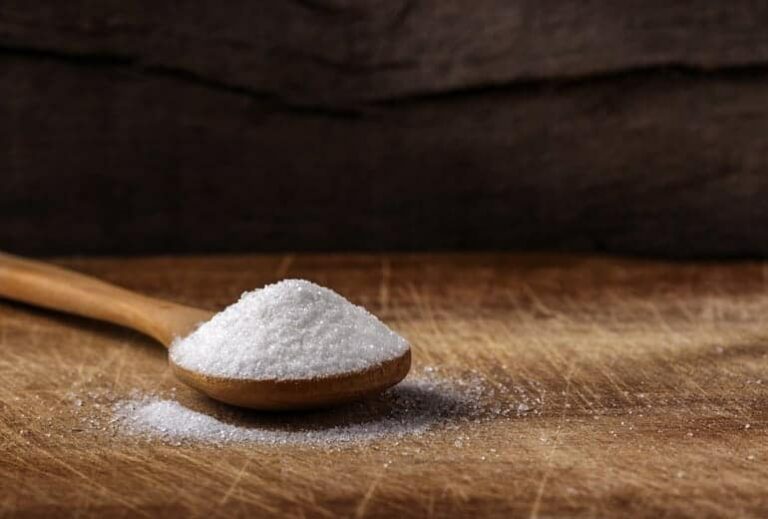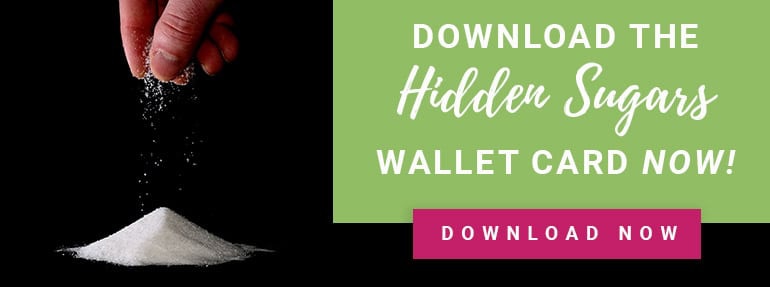How to Avoid Hidden Added Sugar in Your Food

At GreenSmoothieGirl, I try to be all about the good things you eat--and do--to fuel and strengthen your body.
I want to be all about what to say yes to. Not so much about what you gotta say no, no, never to.
But sugar? It’s everywhere, and it’s nasty stuff.
I’ve written before about how sugar can ruin your health--not only is it cancer’s favorite food, but it's as dangerous as alcohol and cigarettes. It causes inflammation, addiction, weight gain, and diabetes.
I’ve also written about beating my own sugar addictions--and recent research is showing that “addiction” is the right word.
Jeff O’Connell refers to sugar as “America’s deadliest habit,” and Dr. Robert Lustig famously describes how sugar and street drugs have a lot in common in the way they affect the human brain and behavior.1,2
One study even shows sugar to be more addictive than cocaine.3
And when we give in to the cravings, sugar “rewards” us by making us feel weak, without willpower, out of control, and guilty.
But you know this. It’s likely you’ve already decided to reduce or eliminate sugar in your diet, and I’ll bet you’ve read a lot of labels, noticing added sugar in everything from bread to soup, and even ketchup.
But while you might know that manufacturers put sugar in all kinds of foods that don't seem like they need it, did you also know that they’re also concealing it by using dozens of different names for “sugar?”
The ingredient may not say “sugar,” but it’s going to trigger the addictions, create the inflammation, and increase your risk of cancer and diabetes, just the same! The first step toward knowing how to avoid hidden added sugar in your food is learning some tricks for spotting them on food labels.
Other names for sugar on ingredient labels
The more we catch on to how deadly sugar is, the more the food industry produces alternatives with tricky or technical names. They would prefer you know less, rather than more, about what you’re eating.
But the list of sugar’s variant names is long.
Most folks are savvy to “sucrose,” “fructose,” and “high-fructose corn syrup” (HFCS) as names for added sugar. Because the -ose suffix was assigned by biochemists to indicate the presence of sugar, you can sleuth for sugars by looking for ingredients with that ending: besides sucrose and fructose, look for dextrose, mannose, maltose, saccharose, and glucose, as well.
Another tip is to watch for “syrups.” Syrups are created by boiling down and concentrating the juices from high-sugar plants like cane and corn. HFCS is the most notorious sugar syrup, of course, but any “syrup” on an ingredient label is an added sugar: malt syrup, rice syrup, refiners’ syrup, carob syrup, maple syrup, and golden syrup are a few more examples.
There are other ingredients with names that are familiar to you, and are even from whole-food sources, but are still concentrated sweeteners and can be considered “hidden sugar:” fruit juice concentrate, honey, maple syrup, molasses, and sorghum.
More ingredients that may not be immediately obvious as being added sugar include muscovado, panocha, treacle, dextrin, and barley malt.
What about the sugar “hiding” in fruit?
The anti-carb folks will hate me for this one. But here’s a fact:
Yes, there are sugars in fruit, but nobody ever got diabetes from eating fruit. In fact, nobody gets fat from eating fruit, either.
(Now, if you’re eating lots of fruit AND you’re eating lots of refined sugar, then you have a problem. But let’s just assume that all of the sugar in your diet comes from fruit.)
Some indigenous people who have no access to Western packaged foods eat lots of fruit, in season. Some cultures, in some parts of the year, it’s the majority of their diet! And they don’t have inflammation, or weight problems. Their diabetic population is approximately zero.
Ignore the diet industry, including the current “low carb” popular trend. Its survival requires you buying their line so you’ll buy their packaged foods. And the line they’re selling is to vilify whole foods with natural sugars in them, which confuses the issue, because we have a problem with refined sugar, not with whole foods that contain natural, simple sugars.
Fruit isn’t your problem. Fruit is packed with phytonutrients and antioxidants and minerals, plus loads of soluble and insoluble fiber, to clean the digestive tract and slow down impact on blood sugar.
If you’re going to worry about sugars, worry about the isolated, concentrated kind. Not the kind you pick off a tree or vine.
What is All This Hidden Added Sugar Doing to Our Bodies?
The sugar industry is trying to wrap C12H22011 (i.e. sugar) up in pretty, natural bows by giving it names like evaporated cane juice and fruit nectar. And we are taking the bait. By the end of 2015, “alternative” sweeteners reached $1.4 billion in annual sales.4
The average American consumes 152 pounds of this sugar—including “natural” and “processed”—every year. 152 pounds! That’s about 6 cups every week! And what’s all that sugar doing to our bodies? It’s making us sick in dozens of ways.
Why is sugar bad for you?
Here are just a few of the 100-plus negative effects sugar has on your body:
- Fuels addiction. Sugar stimulates the same part of our brain as opioids do: the complex reward-center that leaves us constantly seeking our next “hit”.5
- Damages cells and tissues. Researchers from the University of California San Francisco conducted a study that revealed cell aging and sugar consumption went hand in hand. The protective units of DNA (called telomeres) were shorter in those participants who drank the most soda. Shorter telomeres are associated with chronic diseases of aging like heart disease, diabetes, and cancer, and are found in people that smoke cigarettes.6
- Steals happiness. A study conducted by Harvard School of Public Health linked foods that create inflammation, such as sugar and refined grains, with an over 40 percent greater chance of developing depression.7
- Feeds Cancer. Guess what researchers feed cancer in a Petri dish in order to keep it alive? Sugar.
Ever since Otto Warburg won a Nobel Prize for discovering that sugar feeds cancer, study after study has confirmed the cause and effect.8 A cancer cell has 19 insulin receptors, compared with a normal cell’s 2--which is why cancer cells mop up sugar that’s fed to them, and grow. In fact, people undergoing PET scans for cancer drink a concentrated glucose (sugar) solution infused with radioactive material--since cancer cells readily uptake the sugar, the scans light up the tumors feeding on the radioactive glucose.
The sugar industry has known this connection for decades--they tried to bury their own research conducted some 50 years ago, confirming the link between sugar and cancer.9
- Accelerates aging. Sugar destroys the skin’s collagen and elastin—components that make our skin strong and gives it that “bounce-back” ability. Researchers in England and the Netherlands found that those people with the highest blood sugar appeared older than those with the lowest.10
- Suppresses the immune system. Once your blood sugar reaches 120 mg/dl, your white blood cell’s ability to seek and destroy bacteria and viruses is reduced by 75 percent. And blood sugar isn’t even considered “high” until it reaches 130 mg/dl!11
- Damages kidneys, brain and eyes. Sugar builds up in your blood vessels and becomes like sludge when it hits your tiny capillaries. Areas in the body that rely the most on these blood vessels and are susceptible to damage include the kidneys, brain, and eyes. In fact, sugar consumption has been linked to macular degeneration—Americans' number one cause of vision loss.12
- Contributes to heart disease and strokes. Sugar stimulates the liver to dump harmful fats into the bloodstream, leading to high blood pressure and hardening of the arteries.13 In the last 25 years, Americans’ consumption of table sugar has increased by 500 percent, while their intake of fats has gone down. Yet heart disease continues to rise.
According to Dr. Mark Hyman, the glut of high fructose corn syrup on the market has led to the most common disease in America—fatty liver. This, in turn, has led to diabetes, heart attacks, strokes, cancer and dementia.14
What’s the recommended daily sugar intake?
The American Heart Association recommends no more than 6 teaspoons of added sugar per day for women.
I recommend little to no added sugar.
Don’t let the sugar industry fool you with their 61+ names for hidden added sugars. It’s estimated that 74 percent of the packaged foods sold in supermarkets contains sugar.15 The good news? They haven’t started injecting our beautiful, whole fruits and vegetables with the sweet stuff. You're safe, eating whole plant foods.
In order to help you choose foods that are free of what some refer to as the “white devil,” I’ve listed 37 of the most commonly used words for sugar on a wallet-sized card. It’s yours for free.
Just print it, cut it out, and put it in your wallet. Eventually you won't need it, after consulting it several times as you shop. You'll be a label-reading ninja! The wallet card is a little gift to help you live the healthiest life possible.

Disclosure: This post may contain affiliate links that help support the GSG mission without costing you extra. I recommend only companies and products that I use myself.
Resources
1. Jeff O’Connell. Sugar Nation: The Hidden Truth Behind America's Deadliest Habit and the Simple Way to Beat It. New York: Hyperion, 2011.
2. Robert Lustig, "Sugar: The Bitter Truth", University of California Television, 26 May 2009; uploaded to YouTube 20 July 2009.
3. Magalie Lenoir, Fuschia Serre, Lauriane Cantin, and Serge H. Ahmed. “Intense Sweetness Surpasses Cocaine Reward.” PLOS ONE. Public Library of Science, n.d. Web. 01 Aug 2007.
4. Alternative Sweeteners. Freedonia Group. https://www.freedoniagroup.com/industry-study/alternative-sweeteners-2819.htm
5. Thomas Kosten, and Tony George. "The Neurobiology of Opioid Dependence: Implications for Treatment." Science & Practice Perspectives 1.1 (2002): 13-20. Pub Med. Web. 26 May 2017.
6. Norris, Jeffrey. Sugared Soda Consumption, Cell Aging Associated in New Study. UCSF. 10/2014. https://www.ucsf.edu/news/2014/10/119431/sugared-soda-consumption-cell-aging-associated-new-study
7. Inflammatory dietary pattern linked to depression among women. Harvard School of Public Health. Nov. 2013. https://www.hsph.harvard.edu/news/features/inflammatory-dietary-pattern-linked-to-depression-among-women/
8. Hyman, Mark MD. Why you Should Never Eat High Fructose Corn Syrup. Huffpost. 01/2014. https://www.huffingtonpost.com/dr-mark-hyman/high-fructose-corn-syrup_b_4256220.html
9. Hewings-Martin, Yella PhD. Sugar and Cancer: A surprise Connection or 50-year Cover-up? Medical News Today. 11/2017. https://www.medicalnewstoday.com/articles/320156.php
10. Tracy, Betty. Caring for Your Masterpiece: Health and Nutrition. Betty’s Books. 04/2013.
11. Sugar and Your Immune System. Alternative Health Atlanta. https://alternativehealthatlanta.com/immune-system/sugar-and-your-immune-system/
12. Hitti, Miranda. High-Sugar Foods May Affect Eyesight. WebMD. 07/2007. https://www.webmd.com/eye-health/macular-degeneration/news/20070713/high-sugar-foods-may-affect-eyesight
13. Corliss Julie. Eating too much added sugar increases the risk of dying with heart disease. Harvard Health Publishing. 11/2016. https://www.health.harvard.edu/blog/eating-too-much-added-sugar-increases-the-risk-of-dying-with-heart-disease-201402067021
14. Whiteman, Honor. Study Links High Sugar Intake with Increased Risk of Breast Cancer. Medical News Today. 01/2016. https://www.medicalnewstoday.com/articles/304636.php
15. Hidden in Plain Sight. UCSF. https://sugarscience.ucsf.edu/hidden-in-plain-sight/#.WyDMAYpKjIU
Posted in: Health Concerns, Healthy Weight, Lifestyle, Preventive Care, Whole Food


















No comments found, but you can be our first!